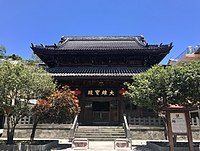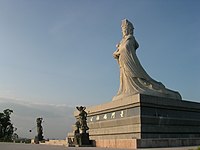Religion in Taiwan (2020 estimate)[1][2]




Religion in Taiwan is characterised by a diversity of religious beliefs and practices, predominantly those pertaining to the continued preservation of the ancient Chinese culture and religion. Freedom of religion is inscribed in the constitution of the Republic of China (Taiwan). The majority of Taiwanese people practice a combination of Buddhism and Taoism often with a Confucian worldview, which is collectively termed as Chinese folk religion.
Many statistical analyses try to distinguish between Buddhism and Taoism in Taiwan, which, along with Confucianism, are rather aspects within broader "ancient Chinese religion". It is hard to make such distinction because various Taoist deities are worshipped alongside deities which originated in Buddhism, for instance Guanyin, in many temples across the country.
As of 2019[update], there were 15,175 religious buildings in Taiwan, approximately one place of worship per 1,572 residents. 12,279 temples were dedicated to Taoism and Buddhism. There were 9,684 Taoist Temples, 2,317 Buddhist Temples, and 2,845 Christian Churches.[3] In Taiwan's 36,000 square kilometers of land, there are more than 33,000 places for religious (believers) to worship and gather. Averaging almost one religious building (temple, church, etc.) for every square kilometer, Taiwan is considered to have the highest density of religious buildings, making it the "most religious" region in the area where Chinese is the majority language.
- ^ "Taiwan, Religion and Social Profile | National Profiles | International Data | TheARDA".
- ^ Cite error: The named reference
moiwas invoked but never defined (see the help page). - ^ "表23各宗教教務概況" (in Chinese). Retrieved 2021-06-02.